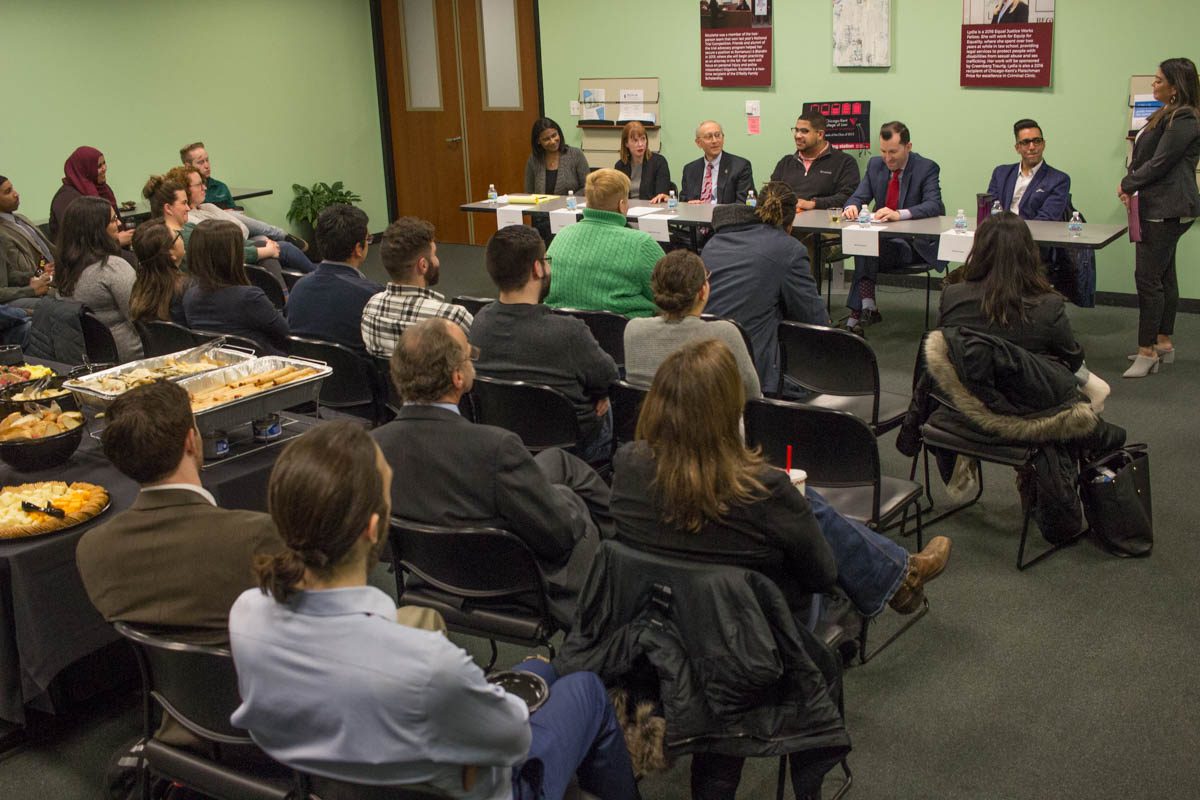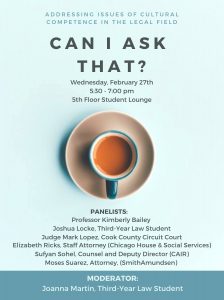 On February 27, our students hosted an event to kick-start our annual diversity week with a panel of judges, attorneys, professors, and students.
On February 27, our students hosted an event to kick-start our annual diversity week with a panel of judges, attorneys, professors, and students.
Each speaker shared their professional journey and how they address diversity and cultural competence in the legal field. Students submitted questions in advance for the event and Joanna Martin, president of HLLSA, moderated the panel discussion.
Panelists:
- Kim Bailey – Associate Professor of Law, Norman and Edna Freehling Scholar
- Elizabeth Ricks– Attorney at Chicago House and Social Services
- Judge Mark Lopez– Cook County Circuit Court Judge
- Josh Locke– 3L Law Student
- Moses Suarez– Attorney at SmithAdmundsen; President of LAGBAC
- Sufyan Sohel– Attorney at CAIR
Questions
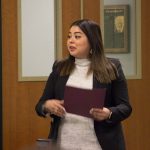 As the moderator, Joanna Martin, President of the Hispanic Latino Law Student Association had a list of questions that were submitted in advance to ask the speakers.
As the moderator, Joanna Martin, President of the Hispanic Latino Law Student Association had a list of questions that were submitted in advance to ask the speakers.
How do you deal with microaggressions or more “subtle” racially charged statements or actions?
Kim Bailey said she prefers to be direct, simply offer corrections. Elizabeth Ricks said in court she often doesn’t have that option and has to be pleasant to avoid issues for her clients.
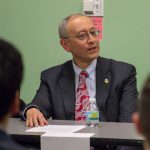
As a judge, Mark Lopez doesn’t have people using language like that in his courtroom, but he would file a complaint to hold them accountable if they did. Moses Suarez tries to view these as opportunities to educate, if he can.
Sufyan Sohel said as an immigrant he’s been used to letting things slide but he believes it’s important to be able to call it out politely and stand up for yourself.
Josh Locke agreed, saying it may be harder to speak up as a student if you’re thinking about what you need to do to keep a position. But in his personal conversations he likes to confront assumptions or bias by asking “What did you mean?” and guiding the person to a better understanding.
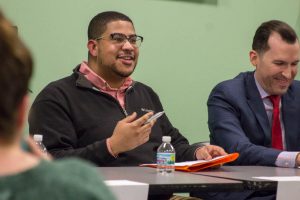
Does it feel like you are representing/speaking for your entire race/faith/group when you get asked a question?

Representation is part of the job for Sufyan Sohel as CAIR-Chicago’s Deputy Director & Counsel, but he still gets lots of questions like “why do you all want to blow us up?” He said there are so many things that define people outside of stereotypes about your group, and he wishes he’d get questions on those things too.
Since these conversations don’t come up often for him, Moses Suarez enjoys opportunities to engage. In his role as co-chair of the Diversity Committee at SmithAdmunsen, getting buy-in often happens through conversations.
If someone asks Joshua Locke “why do black people _____?” He prefers to respond “This black person ____.” Elizabeth Ricks said she also prefers to respond with personal counter examples if someone uses a generalization or stereotype about a group she belongs to.

Kim Bailey agreed, saying there’s a big difference between being asked a question because you’re trying to get to know someone personally and asking about “all black people.”
Knowing how much misinformation is out there, would they prefer that people ask you questions or try to do research on their own?
Kim Bailey and Mark Lopez agreed they’d prefer people ask questions, since it’s hard to know what they’d find online and it’s likely they’d pick an answer that fits what they want to believe.
Moses Suarez noted Google can give “bad advice.” He said it’s best to confirm what you are trying to learn and get feedback on what you’ve found.
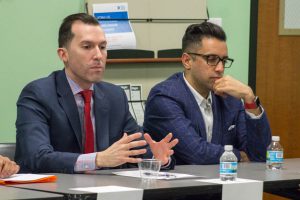
Any tips for people when they’re asking someone else a question about another race/faith/group?
Judge Mark Lopez recommended ask open ended questions “How did you get to ____?” to show you want to know their story.
Be polite, be genuine, people can tell if you come from a respectful place – Sufyan Sohel
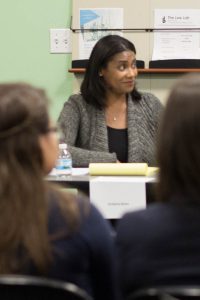
Don’t start with an assumption, said Kim Bailey. It shows respect to personalize the question and try asking in different ways: “Would it help if we did x or y?” not “Are you z and that’s why you do that thing?”
Joshua Lock agreed, saying it’s important not to be so afraid of not having the perfect words that you don’t engage in a conversation. Just be respectful.
Are there differences between how you approach people in a professional environment vs private life?
Yes, Mark Lopez said he doesn’t tell people he’s a judge because he doesn’t want to be viewed differently, just to get to know people. Kim Bailey agreed, saying there are different levels of disclosure in professional spaces, unless you become very close to your coworkers
Moses Suarez cautioned that some younger people are quick to be very personal at work, but that can be a mistake for their professional ambitions.
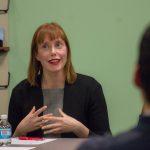 Elizabeth Ricks appreciates that working for a nonprofit she can be honest about the emotional cost of the sexism and homophobia she sometimes experiences in the legal system, where she may have to “grin and bear it.” She said it helps that she doesn’t have to fake her feelings with her coworkers.
Elizabeth Ricks appreciates that working for a nonprofit she can be honest about the emotional cost of the sexism and homophobia she sometimes experiences in the legal system, where she may have to “grin and bear it.” She said it helps that she doesn’t have to fake her feelings with her coworkers.
Are there questions you’re tired of answering?
- “Are you here on a diversity scholarship?” – Joanna Martin
- “Are you here through affirmative action?” – Joshua Locke
- Any comments about her appearance or age while doing her work – Elizabeth Ricks
- “Do you know that black scholar?” (Answer: yes, because I invited them. Not because I know all black scholars. Who each of us invites is another conversation) – Kim Bailey
- “If we hired that person, wouldn’t we have to lower our standards?” – Moses Suarez
event photos
Thanks to all of the sponsors of this event: Office of Diversity, Inclusion, Multiculturalism & Professional Development, Faculty Diversity Committee, Asian Pacific Law Students Association, Black Law Students Association, Hispanic Latino Law Students Association, Chicago-Kent Lambdas, and our Muslim Law Students Association.

